People who
Vitalii Pcholkin – the head of the Group for Active Rehabilitation, a person with a spinal cord injury. He evacuated to Lviv from occupied Bucha and received a House of Europe Emergency Alumni Stipend for basic necessities and for the installation of handrails for wheelchair access in the Collegium of the Ukrainian Catholic University.
During the first month of the full-scale invasion, Vitalii’s NGO worked as a humanitarian headquarters. They organised the evacuation of people with disabilities from hot spots and provided them with basic necessities.
We spoke with Vitalii about difficulties people with a spinal cord injury face during war and peaceful times, about directions in which their organisation works, and about things that shouldn’t be said to people with disabilities.
During the first month of the full-scale invasion, Vitalii’s NGO worked as a humanitarian headquarters. They organised the evacuation of people with disabilities from hot spots and provided them with basic necessities.
We spoke with Vitalii about difficulties people with a spinal cord injury face during war and peaceful times, about directions in which their organisation works, and about things that shouldn’t be said to people with disabilities.
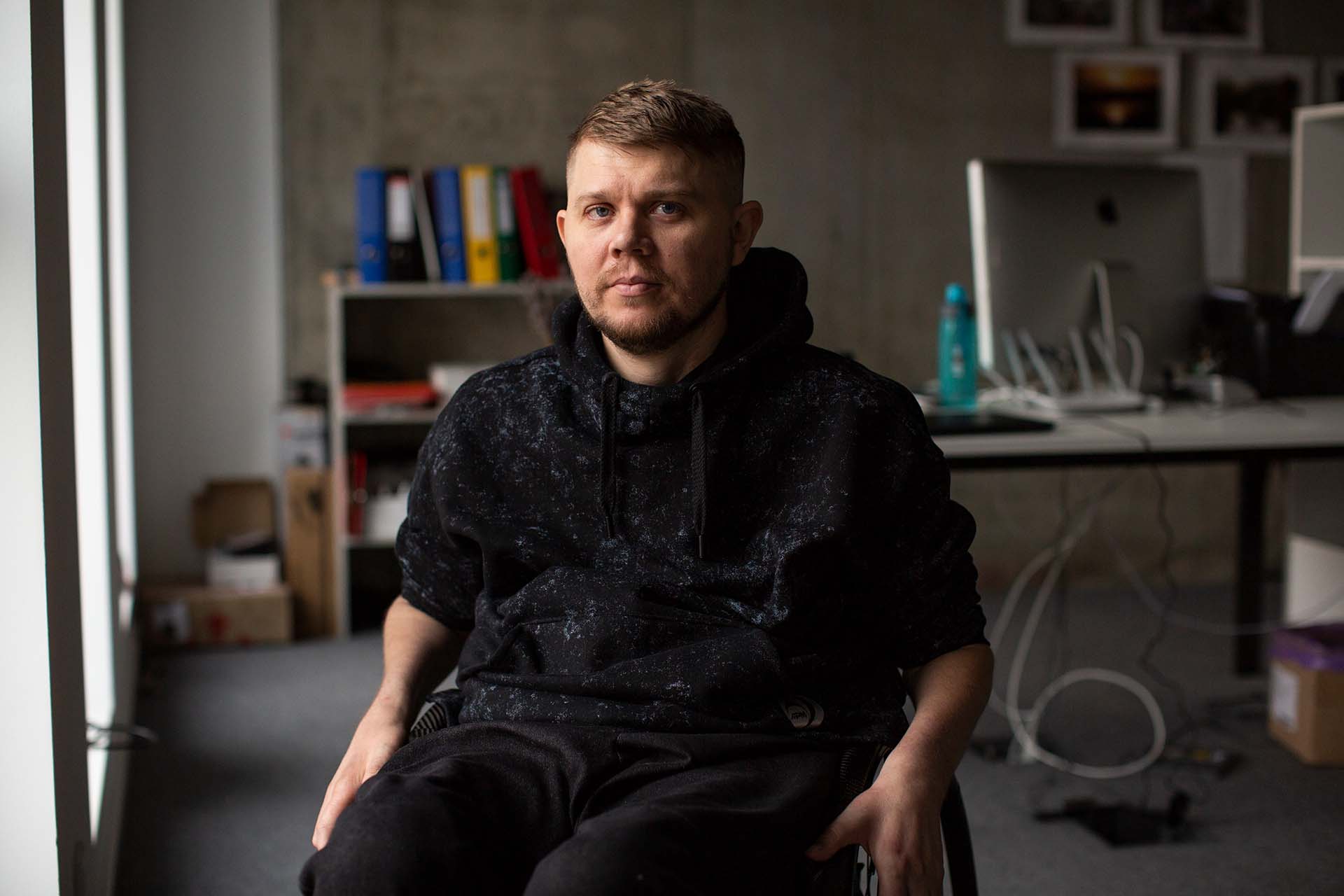
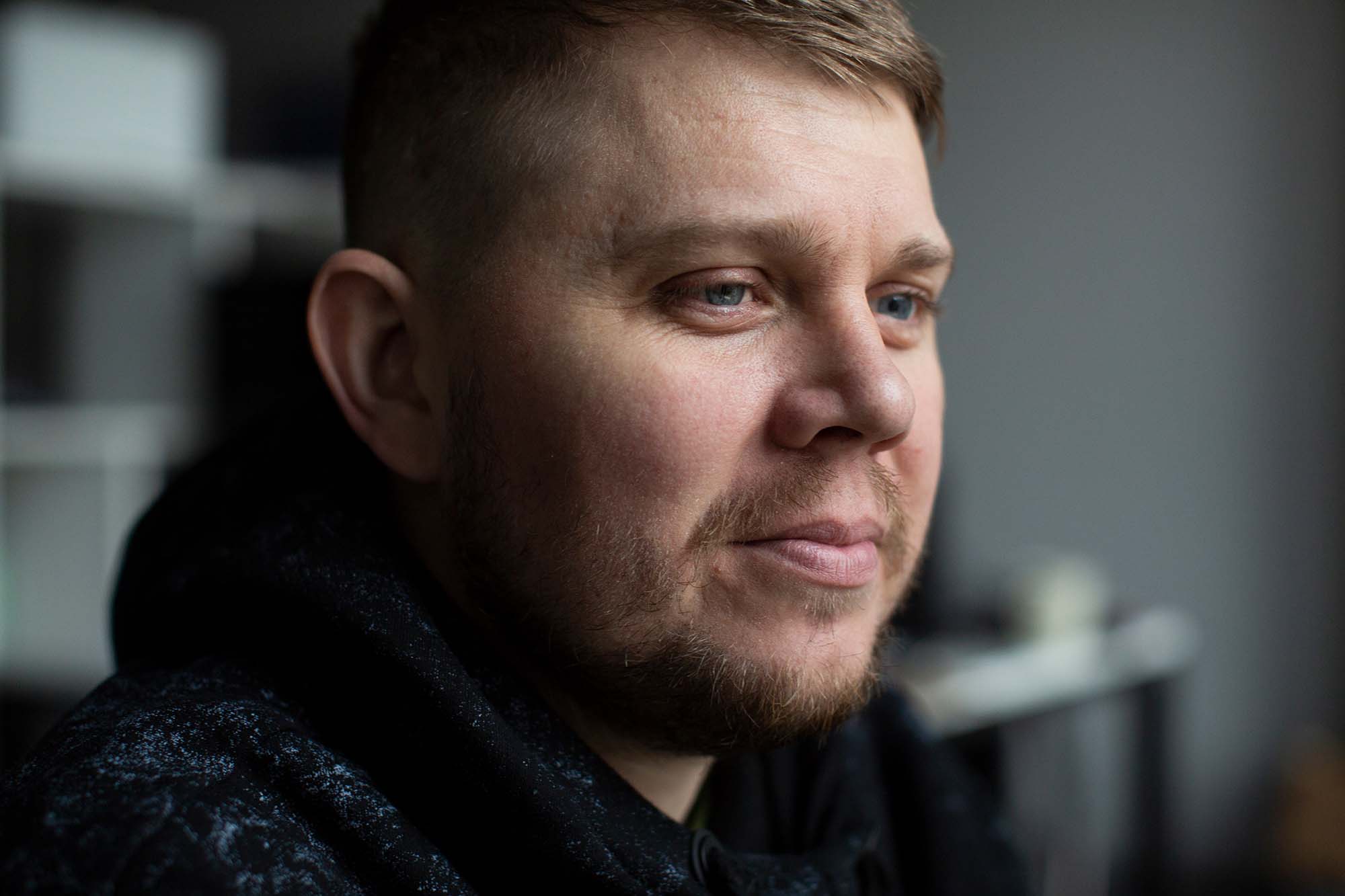
Vitalii was born in Baryshivka, Kyiv Oblast. He lived in Yevpatoriia until the age of 16 and in 2004 he moved to Kyiv.
In 2007, he got a spinal cord injury. The following year, he took part in an active rehabilitation camp. A few years after that he joined a public organisation called Group for Active Rehabilitation of the All-Ukrainian Association of Persons with Disabilities, which organises the camps and promotes adaptation of people with such injuries on an the ‘equal to equal’ basis. After ten years of working in different positions, he became the head of this organisation.
Since 2015, Vitalii had lived in Bucha with his wife, Uliana, where they were caught by the full-scale invasion.
‘In general, we were prepared that it could happen, but at that moment we were shocked. We decided to stay and understand how the events would develop and to try to be helpful where we were,’ Vitalii says.
On 25 February, until noon people could still leave, but then the key routes were blocked by Russian tanks. On 27 February, Russians started shelling buildings, including Vitalii’s house. Russian soldiers destroyed local territorial defence forces and occupied the city.
Almost immediately after the shelling, there was no gas supply, and at the beginning of March there also were no mobile connection, internet, electricity, and water. It was getting colder: about -9°C outside and about +11-12°C at home.
In 2007, he got a spinal cord injury. The following year, he took part in an active rehabilitation camp. A few years after that he joined a public organisation called Group for Active Rehabilitation of the All-Ukrainian Association of Persons with Disabilities, which organises the camps and promotes adaptation of people with such injuries on an the ‘equal to equal’ basis. After ten years of working in different positions, he became the head of this organisation.
Since 2015, Vitalii had lived in Bucha with his wife, Uliana, where they were caught by the full-scale invasion.
‘In general, we were prepared that it could happen, but at that moment we were shocked. We decided to stay and understand how the events would develop and to try to be helpful where we were,’ Vitalii says.
On 25 February, until noon people could still leave, but then the key routes were blocked by Russian tanks. On 27 February, Russians started shelling buildings, including Vitalii’s house. Russian soldiers destroyed local territorial defence forces and occupied the city.
Almost immediately after the shelling, there was no gas supply, and at the beginning of March there also were no mobile connection, internet, electricity, and water. It was getting colder: about -9°C outside and about +11-12°C at home.
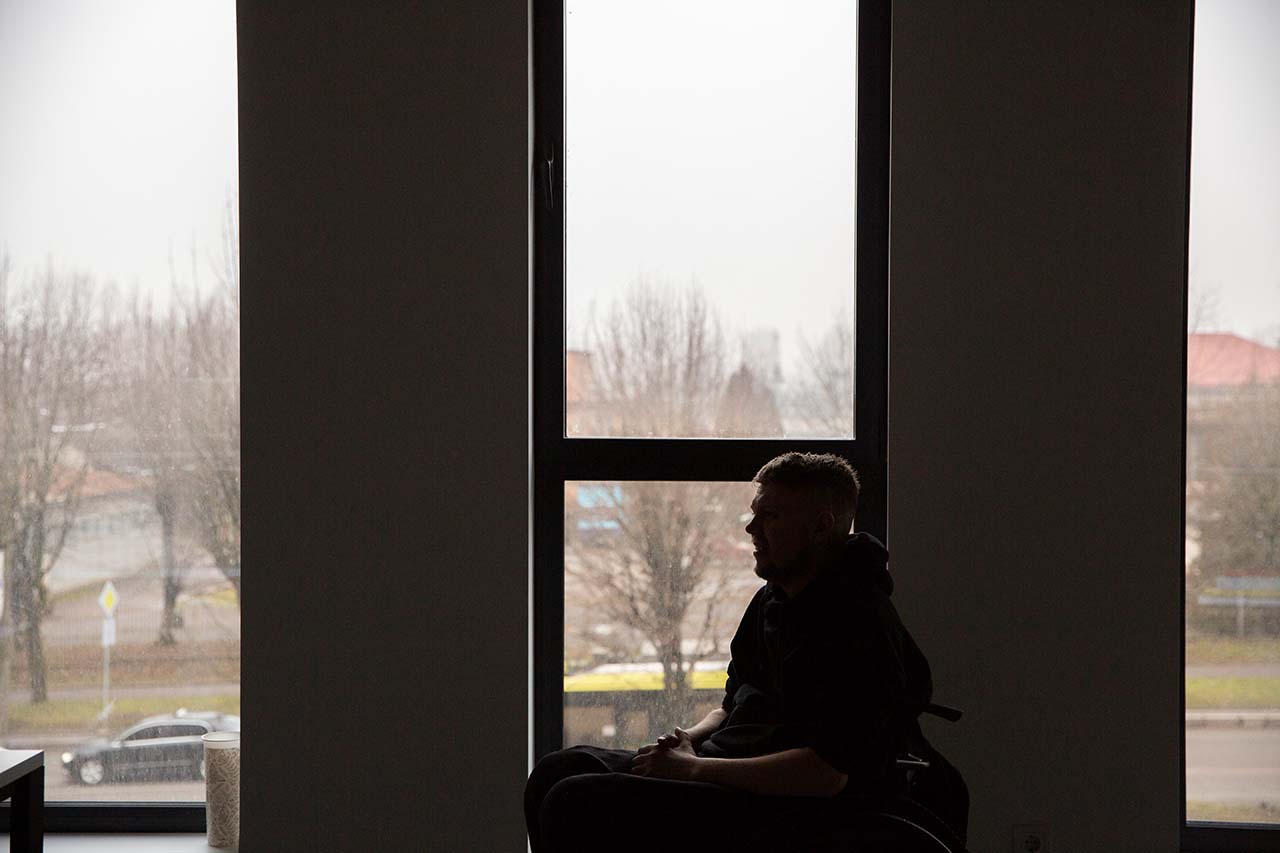
I got the information that there were lists of activists, families of military, and of those who participated in ATO, Vitalii remembers. And we, just recently, like a month before, received awards from Valerii Zaluzhnyi for supporting injured soldiers and ATO veterans from 2014. So we understood that we could be on those lists. That was why we had to find a way to leave.
In order to learn about safe ways of evacuation, Vitalii and his wife were looking for information about ‘green corridors’, but there were none available at that time. At the same time, they communicated with their friends from the Armed Forces of Ukraine. Ukrainian soldiers planned their own special operations in order to move Vitalii and his wife out, but the family refused because it would be dangerous and most probably unsuccessful.
‘On 5 of March, we made posts with an appeal to the international community, so that the people would be given a possibility to leave the city, where, in fact, they already had a humanitarian crisis, Vitalii remembers. The posts went viral and were translated into many languages. I do not know if it contributed to this or something else did, but in the morning on 9 of March, we received the news that a ‘green corridor’ was organised.’
That day, Vitalii and his wife left: first to Makariv, Kyiv Oblast, and the next day to Vinnytsia. In two days they were in Lviv. The family had a car of their own and a minibus that belonged to their NGO. Using the vehicles, they managed to evacuate the neighbours who didn’t have cars. Later they found out that the first agreed route was opened on 10 of March through Irpin and the corridor by which they left was disrupted.
‘My wife and I left with one backpack and our cat, so we almost had no things, Vitalii says. We lived in a dormitory that wasn’t quite adapted and I was physically unable to use the toilet without help. That was why, when I received the newsletter about the House of Europe’s Alumni Emergency Stipends I applied and received support. This stipend was a significant help then. This scholarship was a significant help then. We used this money on clothes, food, and improvement of the dormitory – the purchase and installation of handrails.’
‘On 5 of March, we made posts with an appeal to the international community, so that the people would be given a possibility to leave the city, where, in fact, they already had a humanitarian crisis, Vitalii remembers. The posts went viral and were translated into many languages. I do not know if it contributed to this or something else did, but in the morning on 9 of March, we received the news that a ‘green corridor’ was organised.’
That day, Vitalii and his wife left: first to Makariv, Kyiv Oblast, and the next day to Vinnytsia. In two days they were in Lviv. The family had a car of their own and a minibus that belonged to their NGO. Using the vehicles, they managed to evacuate the neighbours who didn’t have cars. Later they found out that the first agreed route was opened on 10 of March through Irpin and the corridor by which they left was disrupted.
‘My wife and I left with one backpack and our cat, so we almost had no things, Vitalii says. We lived in a dormitory that wasn’t quite adapted and I was physically unable to use the toilet without help. That was why, when I received the newsletter about the House of Europe’s Alumni Emergency Stipends I applied and received support. This stipend was a significant help then. This scholarship was a significant help then. We used this money on clothes, food, and improvement of the dormitory – the purchase and installation of handrails.’
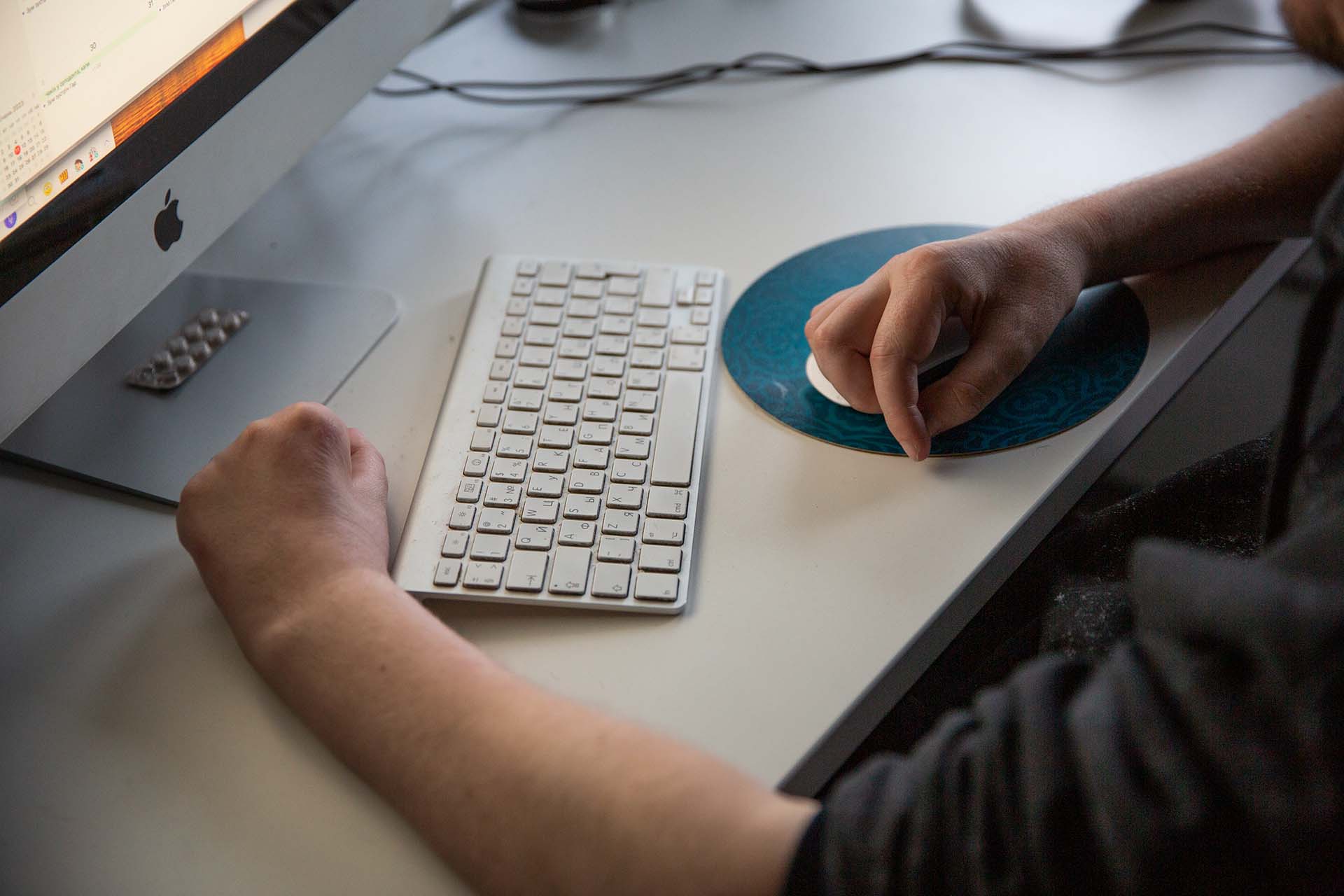
House of Europe launched an open call at the end of March and by the end of June they issued 206 Emergency Stipends. Above all, help was given to alumni who were in occupied territories and close to hostilities. Also, many lost sources of income, workspace, and equipment.
‘We tried to support those who got caught in the toughest situations, Tetiana Manziuk, a programme manager of House of Europe, says. One alumna who got the Emergency Stipend wrote that she had a feeling that somebody took care of her.
That was what we wanted to achieve – to lend a hand, give our community an opportunity to rest for a moment, and gather strength. Because we know that House of Europe alumni are strong agents of change, people much needed by the society during these difficult times.’
Having moved to Lviv, Vitalii’s family temporarily stayed in the Collegium of the Ukrainian Catholic University. There were handrails, but they were installed incorrectly in the room where they first settled. Soon, the couple was moved to another room without handrails at all. Vitalii agreed that he would buy them himself, but the Collegium had to manage their installation because otherwise the agreement and buying would take a lot of time.
The handrails were important for Vitalii to be independent and mobile as he stayed there looking for housing for rent. It was difficult to find an available and minimally comfortable flat in Lviv. They had to look through hundreds of offers. Vitalii says that the apartment had to meet a number of requirements:
‘We tried to support those who got caught in the toughest situations, Tetiana Manziuk, a programme manager of House of Europe, says. One alumna who got the Emergency Stipend wrote that she had a feeling that somebody took care of her.
That was what we wanted to achieve – to lend a hand, give our community an opportunity to rest for a moment, and gather strength. Because we know that House of Europe alumni are strong agents of change, people much needed by the society during these difficult times.’
Having moved to Lviv, Vitalii’s family temporarily stayed in the Collegium of the Ukrainian Catholic University. There were handrails, but they were installed incorrectly in the room where they first settled. Soon, the couple was moved to another room without handrails at all. Vitalii agreed that he would buy them himself, but the Collegium had to manage their installation because otherwise the agreement and buying would take a lot of time.
The handrails were important for Vitalii to be independent and mobile as he stayed there looking for housing for rent. It was difficult to find an available and minimally comfortable flat in Lviv. They had to look through hundreds of offers. Vitalii says that the apartment had to meet a number of requirements:
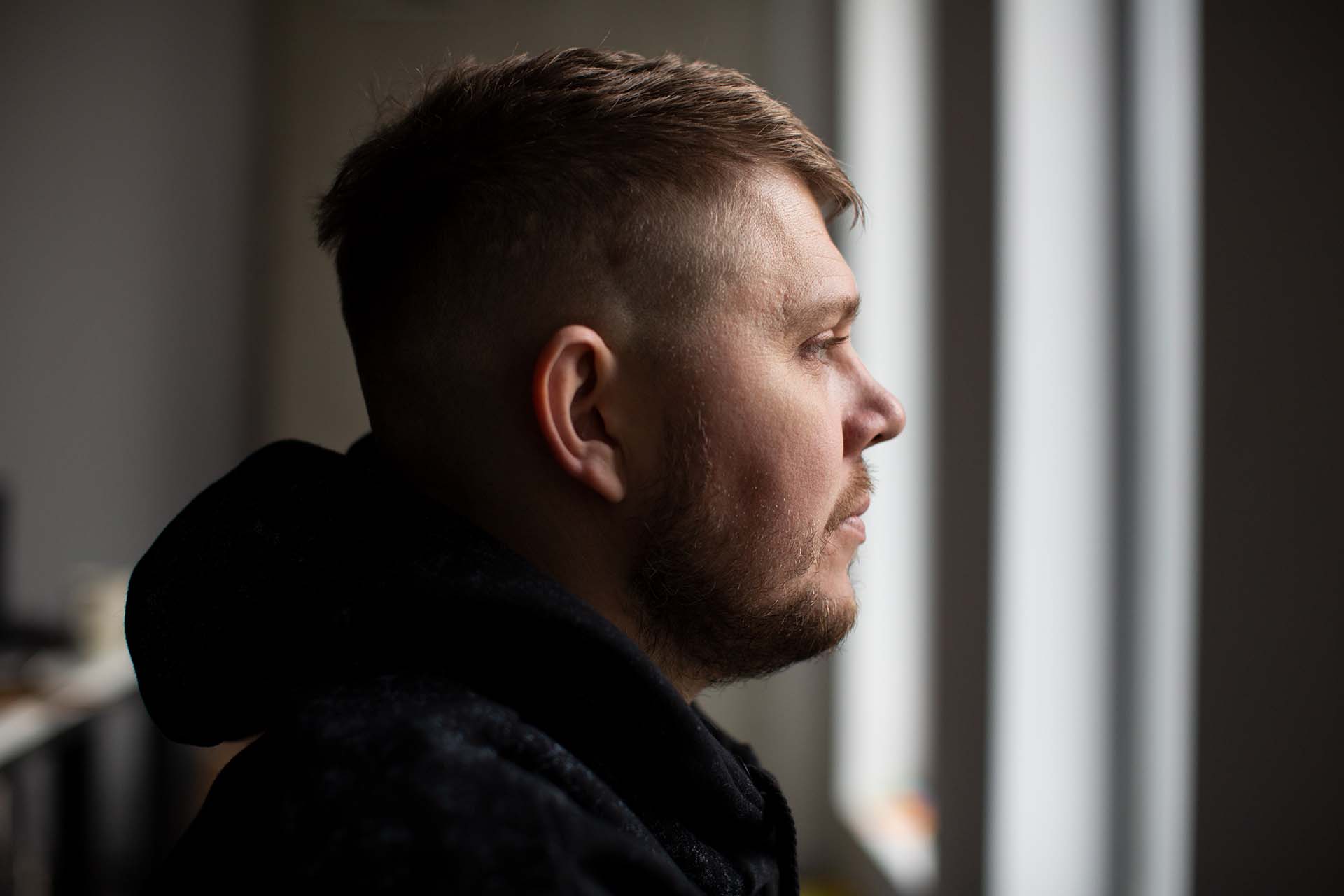
It was clear that there would be problems with electricity, so we needed a flat that wouldn't depend on a lift. A ramp or no stairs at all was another requirement. There needed to be enough space in the apartment and in the bathroom. A special requirement was that there had to be no bath or shower cabin. What I need is a shower drain in the floor so that I can sit on a chair and take a shower
Vitalii had been looking for suitable housing for almost five months, but thanks to the handrails that were installed in the Collegium using House of Europe’s Alumni Emergency Stipend, he could feel more comfortable in temporary housing. And they will be available for students with disabilities who will study there in the future.
How Do People with Disabilities Live During the War?
Vitalii’s NGO Group for Active Rehabilitation continued working even during the full-scale invasion. Even on 24 February, they had a call via Zoom while everybody still had mobile connection. They tried to understand what challenges awaited people with disabilities and how they could deal with them.
One of the main problems was that in Ukraine there was almost no transport for the evacuation of people with disabilities. Because of that, such people had to be carried. Sometimes they had to leave their wheelchairs behind, some of the wheelchairs were damaged during evacuation.
‘When people came, we met them and gave them new wheelchairs, walkers, or tried to provide repair or replacement of broken wheelchairs, Vitalii says.
The biggest problem was the lack of accommodation. There are only a few social institutions that could host people with disabilities, and they were completely full in the first days. Some of our leaders went abroad, and there they had a special task — to look for organisations that would receive people.’
Group for Active Rehabilitation found a partner, a consortium of organisations from several Western European countries. They rented a geriatric boarding house in the Polish city of Holm, on the border between Poland and Ukraine. The project was named Safe House. 200 people have been evacuated thanks to it.
People with disabilities could stay there from seven to fifteen days, while the organisation was looking for housing in European countries for them, mainly in Germany: separate flats or supported living houses. Medical institutions were selected for those who needed treatment or rehabilitation.
How Do People with Disabilities Live During the War?
Vitalii’s NGO Group for Active Rehabilitation continued working even during the full-scale invasion. Even on 24 February, they had a call via Zoom while everybody still had mobile connection. They tried to understand what challenges awaited people with disabilities and how they could deal with them.
One of the main problems was that in Ukraine there was almost no transport for the evacuation of people with disabilities. Because of that, such people had to be carried. Sometimes they had to leave their wheelchairs behind, some of the wheelchairs were damaged during evacuation.
‘When people came, we met them and gave them new wheelchairs, walkers, or tried to provide repair or replacement of broken wheelchairs, Vitalii says.
The biggest problem was the lack of accommodation. There are only a few social institutions that could host people with disabilities, and they were completely full in the first days. Some of our leaders went abroad, and there they had a special task — to look for organisations that would receive people.’
Group for Active Rehabilitation found a partner, a consortium of organisations from several Western European countries. They rented a geriatric boarding house in the Polish city of Holm, on the border between Poland and Ukraine. The project was named Safe House. 200 people have been evacuated thanks to it.
People with disabilities could stay there from seven to fifteen days, while the organisation was looking for housing in European countries for them, mainly in Germany: separate flats or supported living houses. Medical institutions were selected for those who needed treatment or rehabilitation.
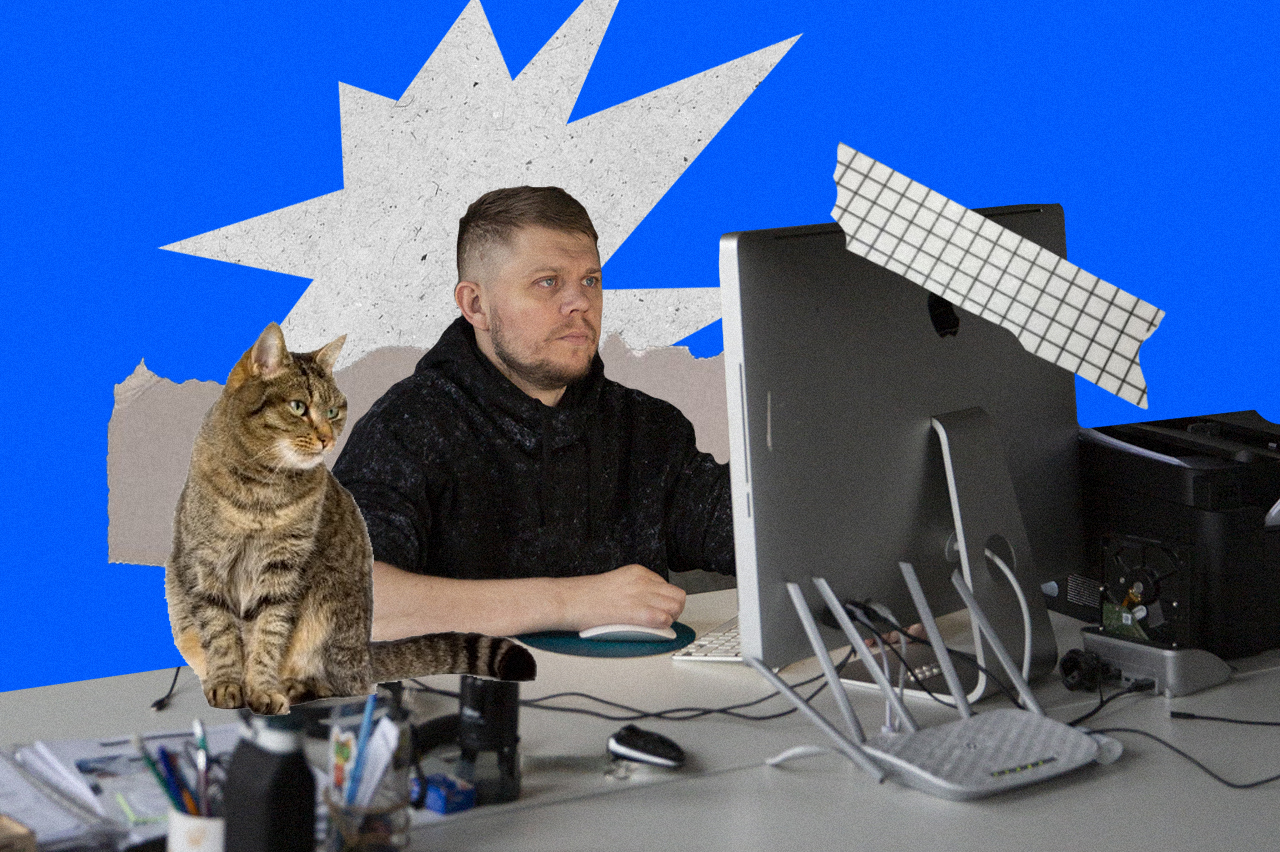
‘Another problem was the availability of means for incontinence, that is urinary incontinence: catheters, urocondoms, Vitalii says. People with a spinal cord injury often cannot go to the toilet without a catheter, it is a vital thing.
The main warehouse of the supplier who brought these products to Ukraine was located between Bucha and Irpin. It was destroyed during the first two days of the invasion along with all the products. Therefore, for the first three months, there were no such means in Ukraine.
We created a coordination centre where people sent their requests: through applications, calls, and social networks. Organisations from Europe sent us humanitarian aid, and we distributed it directly.’
During the evacuation and while staying in territories with shelling and hostilities a lot of people got injured and sick. Vitalii shares his own experience:
‘During the first days, I got too cold and I got inflammation of the bladder (typical occurrence with a spinal chord injury). There was no medicine, no basic hygiene, and no possibility to take a shower. So I left with a fever and then had to be treated for two months afterwards.
I also had to stay in my wheelchair for 20-22 hours a day. Before the full-scale invasion I rarely stayed in the wheelchair for such a long time, but I could easily stay in my wheelchair for around 15-16 hours: I have a good anti-bedsore pillow, suitable shoes, and clothes. So, in general, I managed it without major injuries and wounds.’
But not everybody has got anti-bedsore pillows and due to the necessity to stay in wheelchairs a lot of people got bedsores and wounds.
‘I think some of the people are still treating their injuries because treatment of bedsores in Ukraine is another problem. In fact, we have no places where you can get full treatment and care,’ Vitalii says.
Now the whole population of Ukraine is learning to survive during blackouts and it brings additional difficulties for people with disabilities. According to Vitalii, his colleagues often cannot get home or leave when lifts do not work. They contact the police or the State Emergency Service of Ukraine. Workers of these services come and carry them to their floor.
Vitalii’s team did not conduct a thorough research of Invincibility Points, but those he and his colleagues saw were unavailable for people in wheelchairs. They cannot get there on their own. The same applies to bomb shelters.
There are also people that depend on electricity because of different breathing devices.
The main warehouse of the supplier who brought these products to Ukraine was located between Bucha and Irpin. It was destroyed during the first two days of the invasion along with all the products. Therefore, for the first three months, there were no such means in Ukraine.
We created a coordination centre where people sent their requests: through applications, calls, and social networks. Organisations from Europe sent us humanitarian aid, and we distributed it directly.’
During the evacuation and while staying in territories with shelling and hostilities a lot of people got injured and sick. Vitalii shares his own experience:
‘During the first days, I got too cold and I got inflammation of the bladder (typical occurrence with a spinal chord injury). There was no medicine, no basic hygiene, and no possibility to take a shower. So I left with a fever and then had to be treated for two months afterwards.
I also had to stay in my wheelchair for 20-22 hours a day. Before the full-scale invasion I rarely stayed in the wheelchair for such a long time, but I could easily stay in my wheelchair for around 15-16 hours: I have a good anti-bedsore pillow, suitable shoes, and clothes. So, in general, I managed it without major injuries and wounds.’
But not everybody has got anti-bedsore pillows and due to the necessity to stay in wheelchairs a lot of people got bedsores and wounds.
‘I think some of the people are still treating their injuries because treatment of bedsores in Ukraine is another problem. In fact, we have no places where you can get full treatment and care,’ Vitalii says.
Now the whole population of Ukraine is learning to survive during blackouts and it brings additional difficulties for people with disabilities. According to Vitalii, his colleagues often cannot get home or leave when lifts do not work. They contact the police or the State Emergency Service of Ukraine. Workers of these services come and carry them to their floor.
Vitalii’s team did not conduct a thorough research of Invincibility Points, but those he and his colleagues saw were unavailable for people in wheelchairs. They cannot get there on their own. The same applies to bomb shelters.
There are also people that depend on electricity because of different breathing devices.
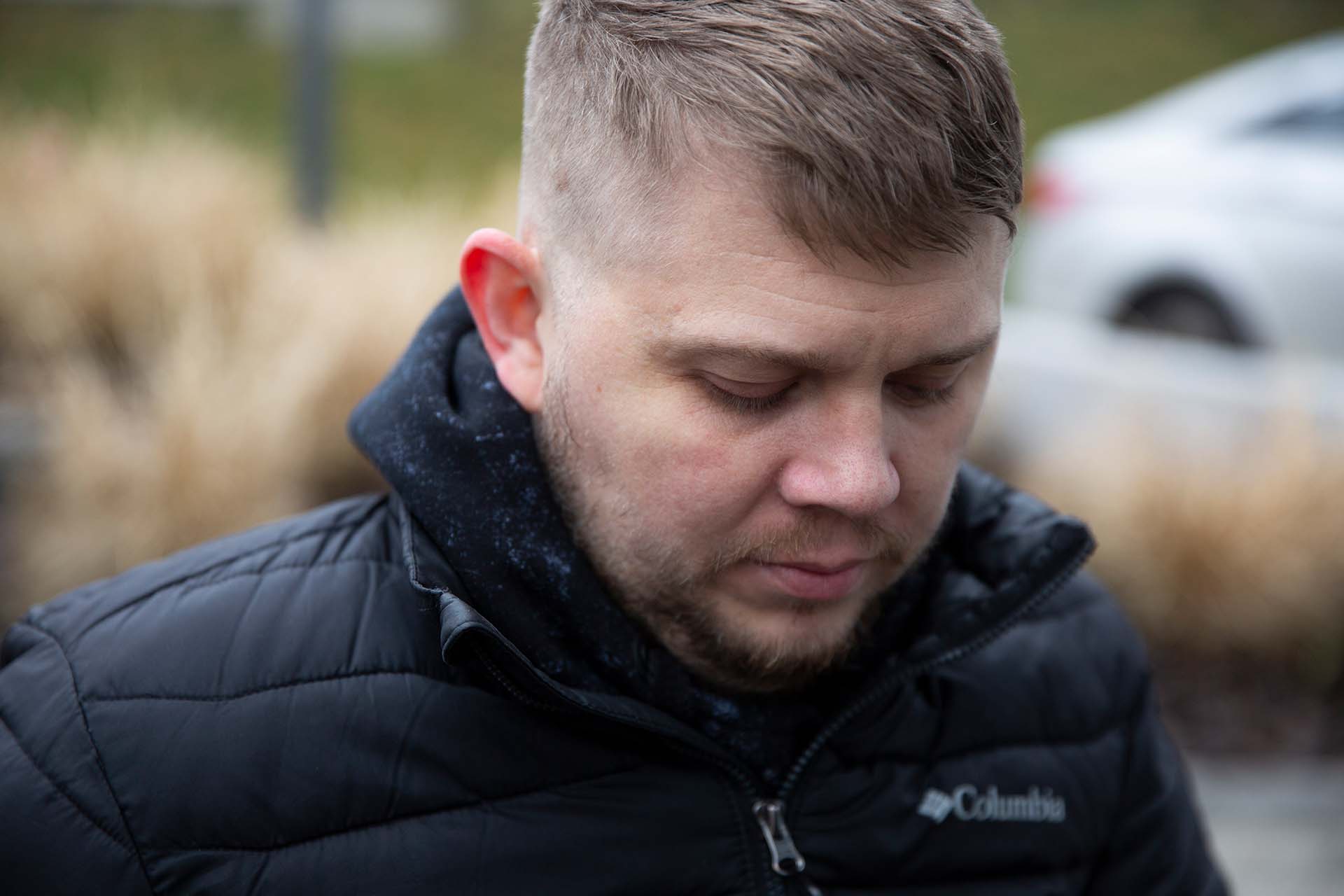
I remember a photo of a girl, whose dad brought her to a petrol station that had a generator because she had an inhaler she could not breathe without. I think we do not even comprehend the number of people that probably died due to blackouts. Not all lives are considered and discussed. We do not talk about why it happened and what we could do. Now, for example, we work with a soldier who has a very serious neck injury. His further life depends on an artificial respiration apparatus, he cannot survive without it.
Besides war challenges, there are difficulties that people with disabilities face every day. The urban environment that is not adapted for wheelchairs, non-compliant ramps that you cannot use on your own, and broken ramps in public transport are among them. Also, there are drivers you have to argue with because they do not stop near the sidewalk but in the middle of the road.
Moreover, there are questions from strangers in the streets: ‘What happened?’, ‘Will you be able to walk?’, ‘Can you have children?’ Even if their questions are an attempt to support you or express sympathy, they can be an unwanted reminder of a traumatic experience. According to Vitalii, such interaction discourages people with disabilities from going out and interacting with society.
Moreover, there are questions from strangers in the streets: ‘What happened?’, ‘Will you be able to walk?’, ‘Can you have children?’ Even if their questions are an attempt to support you or express sympathy, they can be an unwanted reminder of a traumatic experience. According to Vitalii, such interaction discourages people with disabilities from going out and interacting with society.
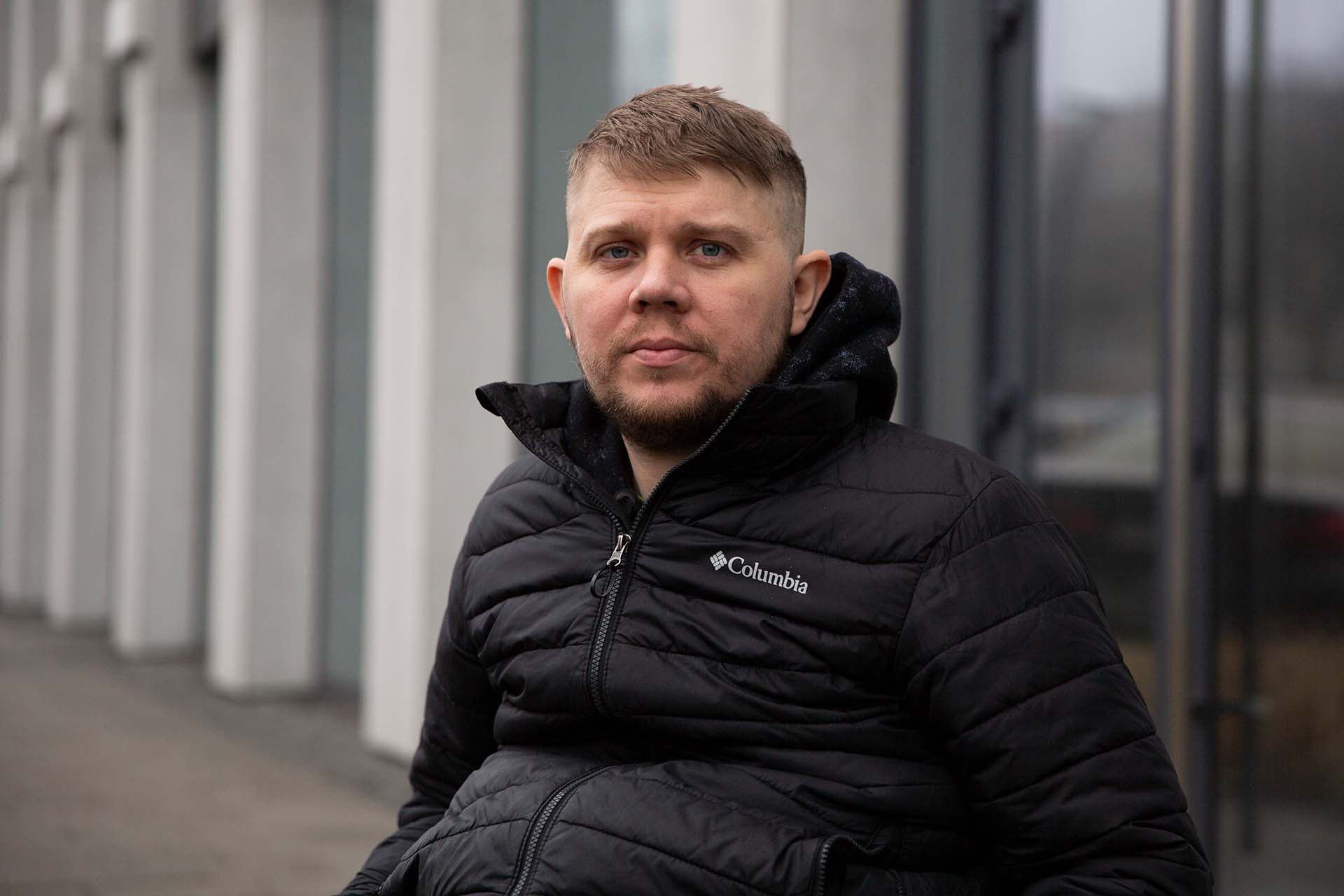
Please, do not give advice on seeing doctors, healers, or going to church. That is what people often do. Sometimes, people approach me without knowing my condition or diagnosis and say something like: ‘I also broke my leg, this healer put me on my feet in two months. Contact him.’ Often people express pity and sympathy and try to give you money, believing the stereotype that all people in wheelchairs are beggars.
‘A few years ago I was buying expensive rum and whiskey in the supermarket near my house before the New Year. The bill was about UAH 2,000. Behind me in the queue, there was a working-class man who was buying a bun and kefir. He saw me paying with my Apple Watch and still, he tried to give me UAH 100.’
There are also difficulties with how to address people with disabilities:
‘You should not use words that can be offensive: people often use words like ‘disabled’ or ‘handicapped’. The correct option is ‘people with disabilities’. We helped our First Lady with the choice of direction for the Barrier-Free Handbook. I was one of the consultants who worked on the handbook, in which we tried to define which terms are acceptable and which are not.’
According to Vitalii, our society is prone to sympathise, and people often try to help. But sometimes they do it when they are not asked to, and that is when their good intentions can be harmful.
‘I can go uphill and for many people, it will look as if I suffer because I move slowly. So, somebody can run up, in the best case they just start pushing but in the worst case they push with a jerk, Vitalii says.
A properly selected wheelchair, which is used by most people for independent movement around the city, is quite finely adjusted. An external physical action can easily overturn it or a person can fall forward. I fell out a lot of times because of this, and my friends got injured because of this.’
So, first of all, always ask a person if they need help and what kind of help they need. Vitalii and his colleagues teach people with disabilities to give clear instructions. For example, if you cannot use stairs on your own they will explain how exactly another person can steer a wheelchair in order not to harm themselves and not to overstrain their back.
There are also difficulties with how to address people with disabilities:
‘You should not use words that can be offensive: people often use words like ‘disabled’ or ‘handicapped’. The correct option is ‘people with disabilities’. We helped our First Lady with the choice of direction for the Barrier-Free Handbook. I was one of the consultants who worked on the handbook, in which we tried to define which terms are acceptable and which are not.’
According to Vitalii, our society is prone to sympathise, and people often try to help. But sometimes they do it when they are not asked to, and that is when their good intentions can be harmful.
‘I can go uphill and for many people, it will look as if I suffer because I move slowly. So, somebody can run up, in the best case they just start pushing but in the worst case they push with a jerk, Vitalii says.
A properly selected wheelchair, which is used by most people for independent movement around the city, is quite finely adjusted. An external physical action can easily overturn it or a person can fall forward. I fell out a lot of times because of this, and my friends got injured because of this.’
So, first of all, always ask a person if they need help and what kind of help they need. Vitalii and his colleagues teach people with disabilities to give clear instructions. For example, if you cannot use stairs on your own they will explain how exactly another person can steer a wheelchair in order not to harm themselves and not to overstrain their back.
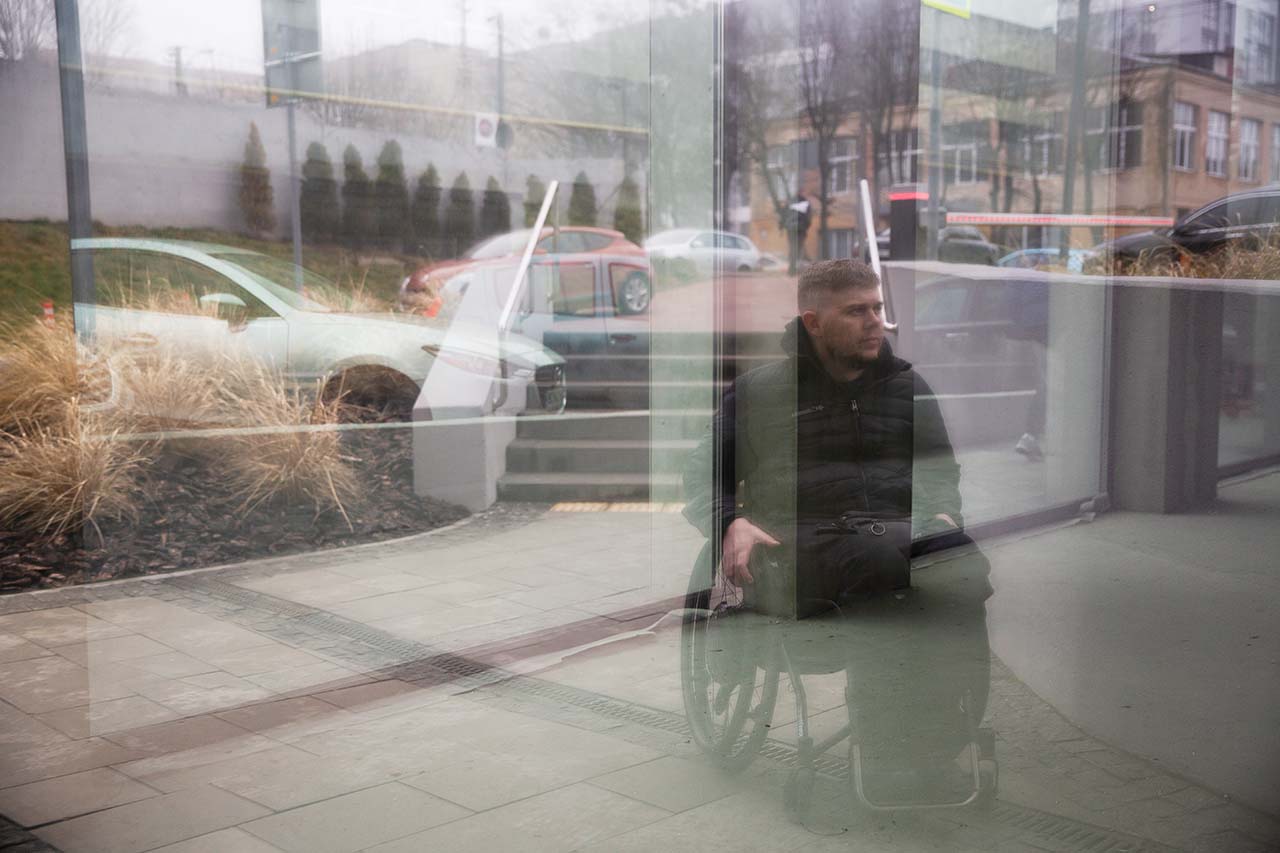
How Does Group for Active Rehabilitation Work Now?
Recently, Vitalii received the Golden Heart award from the president of Ukraine for a significant contribution to the development of the volunteer movement.
From the beginning of the full-scale invasion, Group for Active Rehabilitation worked as a humanitarian and crisis hub, solving urgent issues. Now the team comes back to the stable programmes which they implemented before 24 February and scales them up.
One such programme is active rehabilitation camps. These are 10-day intensive training courses for people who have spinal cord injuries and move in wheelchairs. The key feature of this programme is that people with the same disability share their knowledge and skills via the ‘equal to equal’ method with those who got injured recently or do not have these skills yet.
‘Our leaders are experienced people living full lives: all of them work, have families, and are active. They have adapted to the fullest, Vitalii says.
Due to hostilities, the number of people with injuries and mine-explosive injuries has increased significantly. So now, with the support of the European Union and Isar Ednannia, we prepare new instructors for the First Contact programme.
We chose 60 people with disabilities for the online course, and 20 of them for the offline programme, and now we are organising their work in medical facilities.’
As part of the First Contact programme, spinal cord injury instructors are looking for people who have just been injured and are in medical facilities. They tell the person what condition they have and provide them with very important information on how to prevent complications, accompanied by a spinal cord injury, for example, diseases of the urinary system, bedsores, etc.
According to Vitalii’s experience, during the first weeks after hospitalisation and surgery, more than 70% of people get bedsores of varying complexity, which affect both the rehabilitation process and further quality of their life.
‘Our country equates people with spinal cord injuries to bedridden people, although in fact, they are not, Vitalii assures. In most cases, they were simply not provided with proper support. Our programmes are aimed at helping people to understand what condition they have, motivating them to look for their own solutions on how to improve their lives.’
Recently, Vitalii received the Golden Heart award from the president of Ukraine for a significant contribution to the development of the volunteer movement.
From the beginning of the full-scale invasion, Group for Active Rehabilitation worked as a humanitarian and crisis hub, solving urgent issues. Now the team comes back to the stable programmes which they implemented before 24 February and scales them up.
One such programme is active rehabilitation camps. These are 10-day intensive training courses for people who have spinal cord injuries and move in wheelchairs. The key feature of this programme is that people with the same disability share their knowledge and skills via the ‘equal to equal’ method with those who got injured recently or do not have these skills yet.
‘Our leaders are experienced people living full lives: all of them work, have families, and are active. They have adapted to the fullest, Vitalii says.
Due to hostilities, the number of people with injuries and mine-explosive injuries has increased significantly. So now, with the support of the European Union and Isar Ednannia, we prepare new instructors for the First Contact programme.
We chose 60 people with disabilities for the online course, and 20 of them for the offline programme, and now we are organising their work in medical facilities.’
As part of the First Contact programme, spinal cord injury instructors are looking for people who have just been injured and are in medical facilities. They tell the person what condition they have and provide them with very important information on how to prevent complications, accompanied by a spinal cord injury, for example, diseases of the urinary system, bedsores, etc.
According to Vitalii’s experience, during the first weeks after hospitalisation and surgery, more than 70% of people get bedsores of varying complexity, which affect both the rehabilitation process and further quality of their life.
‘Our country equates people with spinal cord injuries to bedridden people, although in fact, they are not, Vitalii assures. In most cases, they were simply not provided with proper support. Our programmes are aimed at helping people to understand what condition they have, motivating them to look for their own solutions on how to improve their lives.’

Olha Vasina, photographs — Anna Bobyreva
Back to main page
.jpg)